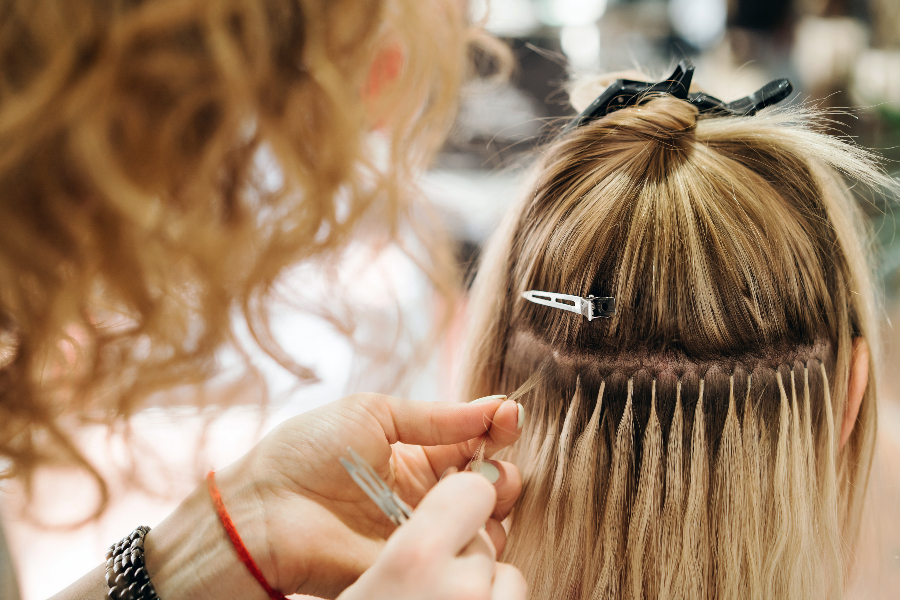No products in the cart.
Hair Care Guide
Do hair extensions cause hair loss?
Do hair extensions cause hair loss? Even when many women find that adding hair extensions is a fun and creative way to change up their hairstyle, many people are concerned whether hair extensions actually cause hair loss to their hair.
If you’re seeking the answer for the above question, you’ve found the ideal place. In this article, Jen Hair shall not only provide the answer and detailed explanation but also give tips on how to prevent the issue!
Curious? Let’s read on!
Related posts:
- Do hair extensions hurt? The truth you may not know
- My hair extensions are dry and frizzy: How to revive them?
- My hair is so thin after extensions: What is the reason?
- Do hair extensions damage your hair? The answer for experts
Do hair extensions cause hair loss?
Do hair extensions cause hair loss? Yes, they do! Hair extensions can cause hair loss. Hair loss from traction alopecia occurs when the hair follicle is yanked out of the scalp. If you use hair extensions frequently or if you don’t know what you’re doing, you are likely to experience this issue.

Without treatment, scars and hair loss are both likely to become permanent. However, the specifics, causes, and duration of hair loss all differ:
- It may depend on the type of extension used: Weaved-in extensions and microbead extensions will do the most damage when placed incorrectly or too firmly. Recommendation: 3 Least damaging hair extensions you should know
- It may be too tight: Tight weaves or extensions that aren’t done properly might cause harm to the arrector pili muscle, which is linked to each hair follicle.
- It may be worn for so long: They can cause damage to the follicle (also known as the root) since they sit so near to the scalp and are worn for a more expected period of time (several months).
- It may be too heavy: The weight of the extra hair, especially if it is dragging on a disproportionately small number of strands, can cause damage to the follicles even if the extensions themselves are not the cause.
Will hair loss from extensions grow back?

If the hair follicle is damaged, no new hair will grow in its place. With that being said, hair loss might be irreversible if you don’t take action. It is crucial to initiate some hair treatments as soon as possible to prevent the inflammatory process in order to save any surrounding follicles that may be saved from destruction.
A bald spot caused by traction alopecia has a good chance of growing back. It’s impossible to foresee how far hair loss may go. It might be a gradual, steady process where there is always enough hair to cover the damaged regions, or it can be a quick, widespread loss.
Applying a 2% or 5% minoxidil solution on your scalp twice a day may help stimulate any remaining little damaged follicles and promote hair growth. If traction alopecia is diagnosed and treated during the first 6 months, most cases heal completely. Regrowing hair on a damaged scalp might take up to a year.
How to prevent hair loss from hair extensions?
When taking care of your hair, pay special attention to the roots, while you wait for them to heal and strengthen. Here are some tips to treat a damaged hair:
- If you have fusion, beads, or any type of attachment style hair extensions, you should think about getting them removed first. Stop using clip-in extensions for a while and let your hair rest so it can grow back healthy.
- If you really must get extensions but are having attachment issues, a professional hair extensionist may be able to help. At the very least, they will be able to advise you on whether or not there are other attachment techniques that will be easier on your roots. You might also choose a lace front wig, which can hide your roots while still looking great.
- Start a regimen of treatments for your scalp every week to encourage new growth and fortify your hair’s follicles. When combined with a carrier oil such as jojoba, just a few drops will help strengthen hair roots.
- Apply the oil to the roots using your fingertips (taking care not to scrape your scalp with fingernails) or a clean cotton swab. Rub the scalp gently. As soon as you’ve finished applying the oil, wrap your hair in a heated towel or a plastic cap that generates heat. Sleeping with oil in your hair is an option, but you should protect your bedding from any spills.
- Keep away from hot blow dryers, irons, and rollers, as well as wet washing in extremely hot water. When experiencing hair loss, the best way to dry your hair is to let it air out.
- Keep in mind that putting too much stress on your hair’s roots might cause thinning, loss, or damage.
Final thoughts
In this article, we have tried our best to answer the question “Do hair extensions cause hair loss?”. The short answer is yes, and even though it can be permanent if you don’t take timely treatment, there are some ways to prevent it easily such as using a gentle shampoo and drying your hair naturally. Jen Hair hopes that you have found this article useful.

 10+ Sleek Hair Ideas for a Polished And Chic Look
10+ Sleek Hair Ideas for a Polished And Chic Look Stunning Styles with Box Braids to Inspire Your Next Look
Stunning Styles with Box Braids to Inspire Your Next Look Shampoo Dry Hair Gently with These Sulfate-Free Picks
Shampoo Dry Hair Gently with These Sulfate-Free Picks
